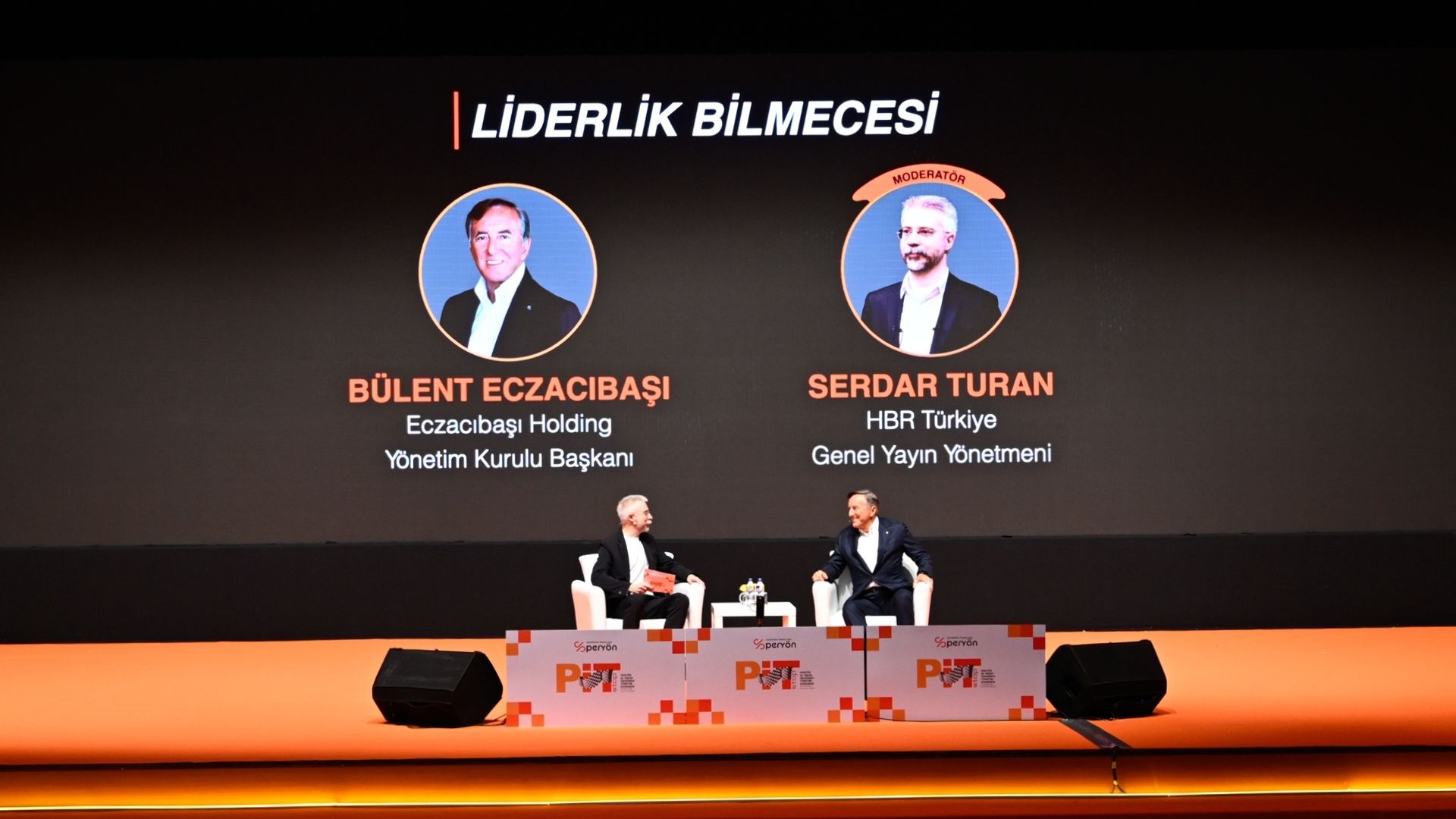The 32nd People Management Congress organized by PERYÖN (People Management Association of Türkiye) brought together business professionals from around the world. This year's theme, "PIT Stop," derived from the Turkish words for Psychology, Human, and Technology, featured keynote speakers, HR professionals, and business leaders from both Türkiye and abroad.
During the congress's opening day, Eczacıbaşı Holding Chairperson Bülent Eczacıbaşı engaged in the "Leadership Puzzle" session with Harvard Business Review Türkiye's Editor-in-Chief, Serdar Turan. Emphasizing the importance of "focusing on leadership rather than the leader," Eczacıbaşı shared valuable insights from his leadership experience.
We are pleased to present highlights from this informative discussion on leadership for the Eczacıbaşı Life Blog.

Serdar Turan: What is the leadership puzzle? And have you been able to solve it?
Bülent Eczacıbaşı: The leadership puzzle is discovering what all leaders have in common. If you ask, “What do leaders have in common as human beings?” you have identified the leadership puzzle. Numerous studies have been done on this topic, you can examine them yourself. But you’ll be wasting your time because there’s no simple answer.
Throughout history, great leaders have emerged from every race, nation, and profession. They all share traits like diligence, intelligence, and passion, but these traits are essential for success in any field and don't give us specific clues about leadership.
So where is the answer to the puzzle? It lies in shifting our focus from leaders to leadership itself. Instead of asking "What do leaders have in common?" we should ask "What do leaders do in common?" The answer then becomes clear: Almost all of them give people hope, hope for a better life, for a peaceful world, for freedom, for independence. In doing so, they share a compelling vision that becomes their blueprint for the future. This vision, rooted in unwavering faith, is what truly unites all leaders.
Serdar Turan: Can we conclude from your points that leadership is a skill that can be learned?
Bülent Eczacıbaşı: Yes, absolutely. By observing successful leaders' actions and methods, we can identify clear patterns. Leadership isn't an innate talent – it's a set of learnable behaviors. When you study leaders, you notice common traits in their approach: prioritizing team success over personal glory, giving credit where it's due, thanking people, and showing respect to others.
One crucial leadership trait is the willingness to share – whether it's information, enthusiasm, or vision of the future. These leadership characteristics can be studied and developed through conscious effort and practice.
Serdar Turan: You have a good recommendation for how to observe leadership: “Looking at leadership is like looking at a mountain or a work of art; you have to step back and study it from a distance." From this broader perspective, we can observe corporate culture more clearly. In our recent articles, we've stressed that a key challenge for any leader is embodying and shaping corporate culture. What are your thoughts on this dynamic relationship?
Bülent Eczacıbaşı: Leadership is the primary driver of corporate culture and leaders bear the fundamental responsibility of nurturing and evolving it; it’s a duty that can’t be delegated or transferred. The Asian metaphor comparing organizational culture to aquarium water is particularly apt. Our attention may be drawn to the rare and exotic fish within, but it’s the quality of the water that’s paramount to their survival. Similarly, leaders must ensure their corporate environment remains pure and untainted. Cultural deterioration can occur in various ways, such as the appointment of unsuitable leaders or new leadership unfamiliar with existing cultural values and the emergence of dominant subcultures that overshadow the core organizational culture. These problems, though common, are not insurmountable. Given that employees naturally emulate the communication styles and behavioral patterns of their leaders, cultural transformation becomes achievable through leadership changes or behavioral adjustments.
Serdar Turan: How should HR leaders position themselves and navigate through these challenging times?
Bülent Eczacıbaşı: One of the most fundamental questions in management, particularly in human resources, is about positioning: Should HR align more closely with employees or with top management? This complex question requires managers to find their own balance based on their leadership style and organizational needs. However, achieving this balance is an ongoing challenge, as most people aren’t satisfied with the solution they’ve found. Based on my experience, I recommend that HR managers maintain at least the same level of connection with employees as other leaders do – perhaps even more. An HR manager who appears more aligned with management interests than management itself can create significant organizational problems.
Serdar Turan: When discussing long-term concepts or raising them in conversations, our leaders often respond, "I'm dealing with immediate crises, and you're talking about compassionate leadership. I have immediate operational problems to solve right now." This raises an important question: How can leaders effectively balance long-term vision with the immediate challenges of day-to-day operations?
Bülent Eczacıbaşı: A manager or leader must simultaneously inhabit both the present and future, and be realistic about today while imagining tomorrow. This dual perspective requires them to clearly define and communicate current realities while maintaining an aspirational vision for what lies ahead. There’s a definition of leadership I like: "The first duty of a leader is to define reality, the last is to say thank you. In between, the leader is a servant." This statement encapsulates the essence of servant leadership, where the first step is establishing reality through an unflinching assessment of existing circumstances.
Serdar Turan: If I were to ask you to identify the most significant challenge in people management – one that transcends time, industry, and sector – what would your answer be?
Bülent Eczacıbaşı: That’s a very good question. Let me take this opportunity to address a pervasive issue in management that transcends time, geography, company size, industry; actually, it’s a problem we all have: the human ego. Ego is an inherent trait that drives self-preservation and has been crucial to our evolution and survival, but its excess can become problematic. It’s difficult to work with individuals who are exclusively self-focused. This behavior can escalate to narcissism, where success leads to overwhelming pride and failure triggers profound despair. Such individuals can be particularly detrimental to organizations, yet they often remain in positions of influence due to their professional accomplishments. Several warning signs can help identify excessive ego in the workplace. These include individuals who dominate conversations with self-reference, marginalize their team's contributions, or claim collective achievements as personal successes. Perhaps the most telling are those who consistently speak of future accomplishments rather than demonstrating actual results – those who favor promises over performance. Being vigilant to these indicators is crucial for maintaining a healthy organizational culture.



